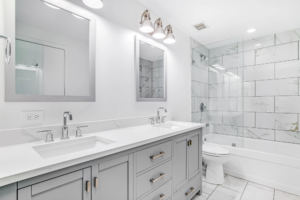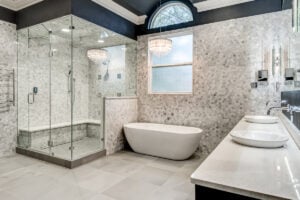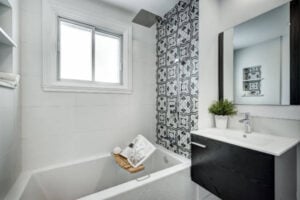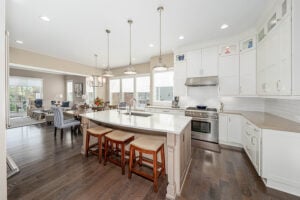What are the typical costs involved in custom home remodeling in Oldsmar, Florida
- Bathroom Remodel Contractors Oldsmar, Bathroom Remodel Costs Oldsmar, Bathroom Remodel Reviews Oldsmar, Bathroom Remodelers Oldsmar, Bathroom Remodeling Services Oldsmar, Bathroom Renovation Companies Oldsmar, Best Bathroom Remodel Oldsmar, Home Reno, Small Bathroom Remodel Oldsmar
- How long does a typical custom home remodeling project take in Florida
- How does the permitting process in Oldsmar impact the timeline of a remodeling project
- What are the most common reasons for delays in the permitting process
- What are the best practices for obtaining all prior approvals before starting a custom home remodeling project in Oldsmar
- What are the most common reasons for permit denial in Florida
The costs involved in custom home remodeling in Oldsmar, Florida vary widely based on the scope of the project, materials, and location. Here is a breakdown of typical expenses:
General Remodeling Costs
- Per Square Foot: Remodeling projects generally cost between $50 and $150 per square foot, depending on the complexity and quality of materials used.
- Full Home Renovation: Costs range from $100 to $250+ per square foot, with $175 being the average for mid-range renovations.
Room-Specific Remodeling Costs
- Kitchen Remodel:
- Budget: Starting at $150 per square foot or $15,000 for 100 sq ft.
- Mid-grade: Starting at $325 per square foot or $32,500 for 100 sq ft.
- High-end: Starting at $650 per square foot or $65,000 for 100 sq ft.
- Bathroom Remodel:
- Budget: Starting at $300 per square foot or $10,500 for 35 sq ft.
- Mid-grade: Starting at $570 per square foot or $19,950 for 35 sq ft.
- High-end: Starting at $630 per square foot or $22,050 for 35 sq ft.
- Living Room/Bedroom: Average costs range from $5,000 to $15,000, depending on size and finishes.
- Attic/Basement Conversion: Costs range from $12,300 to $33,300.
Additional Costs
- Painting: Ranges from $300 to $28,000 depending on the area and type of paint used.
- Flooring: Wood flooring installation costs between $6.73 and $9.44 per square foot in Oldsmar.
- Plumbing Fixtures: Installing sinks, faucets, and pipes costs between $4,180 and $5,400.
Factors Influencing Costs
- Material Quality: Higher-end materials significantly increase costs.
- Labor Rates: Vary by region within Florida.
- Permits and Inspections: Typically cost between $1,200 and $5,000, depending on the project scale.
Custom remodeling can enhance your home’s value and functionality but requires careful budgeting to align with your goals.
How long does a typical custom home remodeling project take in Florida
The duration of a typical custom home remodeling project in Florida varies depending on the scope and complexity of the work. Based on the available information, here’s an overview of typical timelines:
Project Duration by Scope
- Minor Renovations:
- Kitchen remodel: 8 to 10 weeks
- Bathroom remodel: 6 to 8 weeks
- Major Renovations:
- Full apartment renovation: 4 to 8 months
- Single-family home renovation: 4 to 8 months
- Extensive Remodeling:
- Full home renovation: 6 to 12 months
Phases of Remodeling
- Planning Phase: 4 to 20 weeks, depending on project complexity
- Construction Phase: Varies based on the scope, but typically includes:
- Structural and mechanical work: 2 to 4 weeks
- Framing and insulation: 1 to 2 weeks
- Drywall and plastering: 1 to 2 weeks
- Flooring installation: 1 to 2 weeks
- Cabinetry and fixtures: 2 to 3 weeks
- Painting and finishing: 1 to 2 weeks
- Final touches and cleanup: 1 to 2 weeks
It’s important to note that these timelines are estimates and can be affected by factors such as material availability, weather conditions, and the complexity of the design. Additionally, the current date (February 10, 2025) may impact project timelines due to potential changes in the construction industry or local regulations since the time the search results were published.
How does the permitting process in Oldsmar impact the timeline of a remodeling project
The permitting process in Oldsmar significantly impacts the timeline of remodeling projects, often extending the overall duration. Here’s how:
Permit Acquisition Timeline
- The permitting process typically takes 4 to 12 weeks for initial review and approval.
- For complex projects involving multiple trades (Building, Fire, Mechanical, Electrical, and Plumbing), the process can extend to 20 weeks or more.
- Each trade department usually takes about two weeks for initial review.
Factors Affecting Permit Timelines
- Project Complexity: Larger or more complex projects require longer review periods.
- Multiple Review Cycles: Often, more than one review cycle is necessary, with each cycle taking about two weeks per trade.
- Response Time: Delays in addressing department comments can extend the timeline further.
- Project Size: Larger scale projects may take longer to approve than smaller ones.
Impact on Overall Project Timeline
- Permitting can add up to two months to the project timeline before work can begin.
- The entire building permit process, from application to approval, can take from a few weeks to several months.
- Construction cannot legally start without an approved permit, potentially disrupting workflow and causing project delays.
Strategies to Minimize Delays
- Start the permitting process early, as soon as the decision to remodel is made.
- Ensure all required documents are complete and accurate to avoid resubmittals.
- Work with experienced contractors who can respond quickly to department comments.
- Consider using permit expeditors to streamline the process.
Understanding and planning for these permitting timelines is crucial for setting realistic expectations and ensuring a smoother remodeling process in Oldsmar.
What are the most common reasons for delays in the permitting process
The most common reasons for delays in the permitting process include:
- Incomplete or inaccurate documentation:
- Missing required seals from architects, plumbers, or electricians.
- Construction plans lacking sufficient details or not drawn to scale.
- Plumbing plans without riser diagrams.
- Incomplete application forms or missing information.
- Complex requirements and processes:
- Difficulty in researching and understanding varying city-specific requirements.
- Multiple stakeholders involved, leading to coordination challenges.
- Changes mid-process:
- Altering the nature of work during the review process.
- Modifying submitted plans after initial submission.
- Slow response times:
- Delayed or partial responses to correction lists after permit review.
- Lengthy jurisdiction review periods.
- Bureaucratic inefficiencies:
- Outdated city systems and technology.
- Understaffed building departments, especially during sudden application surges.
- Failure to obtain prior approvals:
- Not securing necessary approvals from various departments or agencies before applying.
- Inaccurate cost estimates:
- Underestimating or omitting true costs of work on applications.
- Inadequate staffing and expertise:
- Building departments with minimal education and training in building codes.
- Labor shortages in permitting offices.
By addressing these common issues, project teams can potentially reduce delays and streamline the permitting process.
What are the best practices for obtaining all prior approvals before starting a custom home remodeling project in Oldsmar
To ensure a smooth process for obtaining all prior approvals before starting a custom home remodeling project in Oldsmar, follow these best practices:
1. Research Local Requirements
- Understand the specific building codes, zoning laws, and permit requirements in your city or county. Florida law mandates permits for most construction work, including remodeling, under Section 105.1 of the Florida Building Code.
- Check if your property is part of a community governed by an Architectural Review Committee (ARC), as they may have additional guidelines such as landscaping budgets or exterior design requirements.
2. Prepare Complete Documentation
- Submit detailed construction plans that include site surveys, blueprints, and specifications for plumbing, electrical, and mechanical systems. These plans must comply with local codes and often require a licensed architect or engineer’s seal.
- Ensure documents are accurate and complete to avoid delays during the review process.
3. Obtain Engineer-Approved Plans
- Work with a licensed Oldsmar engineer to review and approve your plans for structural integrity and compliance with state regulations. This is especially important for hurricane-prone areas.
4. Secure ARC or HOA Approvals (if applicable)
- If your property is within an ARC-governed community, submit building plans, lot surveys, and other required documents early. This helps avoid delays caused by extensive design guidelines or approval conditions.
5. Submit Permit Applications Early
- Apply for permits as soon as plans are finalized. The permitting process can take 2–20 weeks, depending on the project scope and local agency workload.
- Be prepared for multiple review cycles; address any comments or corrections promptly to minimize delays.
6. Collaborate with Experienced Professionals
- Hire licensed contractors who are familiar with Oldsmar’s permitting processes. They can assist with documentation, respond to agency feedback quickly, and ensure compliance at every stage.
7. Plan for Inspections
- Anticipate inspections during and after construction to verify compliance with approved plans. Schedule these inspections in advance to avoid delays in project milestones.
By adhering to these best practices, you can streamline the approval process and reduce potential delays in your custom home remodeling project in Oldsmar.
What are the most common reasons for permit denial in Florida
Based on the search results, the most common reasons for permit denial in Florida include:
- Insufficient documentation or information provided
- Missing required seals from architects, plumbers, or electricians
- Incomplete application forms or missing information
- Construction plans lacking sufficient details or not drawn to scale
- Non-compliance with local regulations and codes
- Violation of building codes, zoning laws, or specific permit requirements
- Failure to adhere to safety standards or use of substandard materials
- Unsafe conditions in the proposed building
- Situations where the building plans present significant safety hazards that cannot be remedied
- Potential damage or negative impact on nearby properties
- Proposed construction that could cause structural strain, increased traffic, or noise pollution to neighboring properties
- Incompatibility with surrounding properties
- Design or aesthetics that do not align with existing properties in the area
- Failure to obtain prior approvals
- Not securing necessary approvals from various departments or agencies before applying for the main permit
- Unauthorized alterations or modifications
- Making changes to structures without proper approval
- Neglecting required inspections
- Failing to schedule or address deficiencies identified during inspections
Understanding these common reasons for permit denial can help applicants better prepare their submissions and avoid delays in the permitting process.

Bathroom Remodel Contractors in Oldsmar: How to Choose the Right One
Choosing the right Oldsmar bathroom remodel contractor can be a daunting task, but with a systematic approach, you can find a reliable and skilled professional.

DIY vs. Professional: Oldsmar Bathroom Remodel Reviews
Here’s a comparison of DIY and professional bathroom remodel reviews in Oldsmar and experiences: DIY Bathroom Remodel Reviews Professional Bathroom Remodel Reviews Comparison Summary Aspect

How to Find Reliable Bathroom Remodelers in Oldsmar
Finding reliable bathroom remodelers in Oldsmar involves a combination of research, referrals, and careful evaluation. Here are some steps to help you find trustworthy professionals:

Luxury Bathroom Remodeling Services in Oldsmar for a Spa-Like Experience
Luxury bathroom remodeling services in Oldsmar can transform your ordinary bathroom into a spa-like oasis, offering a serene retreat within your home. These services focus

Top 10 Bathroom Renovation Companies Near Oldsmar
Finding the top 10 bathroom renovation companies near Oldsmar involves several steps: Steps to Find Top Bathroom Renovation Companies Tips for Choosing a Company By

Bathroom Remodel Contractors Oldsmar
When looking for a bathroom remodel contractor in Oldsmar, there are several key factors to consider: Credentials and Experience Ensure the contractor is licensed, insured,

Best Bathroom Remodel Oldsmar
When considering bathroom remodeling in Oldsmar, there are several key factors to keep in mind to ensure you make the best choices for your renovation

Easy Bathroom Remodel Upgrades in Oldsmar
Here are some easy and impactful Oldsmar bathroom remodel upgrades that can enhance both the aesthetics and functionality of your space without extensive renovations: These

What are the typical costs involved in custom home remodeling in Oldsmar, Florida
The costs involved in custom home remodeling in Oldsmar, Florida vary widely based on the scope of the project, materials, and location. Here is a


